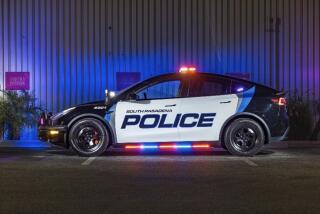Scooter Commuters: A New Force in the Workplace
- Share via
It wasn’t enough for them to spit in the face of corporate seniority (Colossal stock options for everyone!), of stuffy dress codes. (Just dressing is good enough for them.) They don’t stop, this digital crowd, forever upending workplace culture in their land of the freewheeling, home of the unconventional. Now they must zip around in a way that is different from you and me.
A low-tech way, really, and the irony suits them.
These days, they are whizzing by the rest of us in their own dress-down version of the commute and the walk down the long hall.
At high-tech start-ups in the Silicon Valley--and, lately, in other urban areas and workplaces--the company car of choice is . . . the scooter. Top executives zoom into work on a PTV, or Personal Transportation Vehicle, some with a cell phone or latte in hand. Recruiters use the idea of their corporate scooters as a selling point, the very phrase “scoot to work” implying levity. For meetings across the way, techies jump on company scooters, usually powered by foot or electricity, liability be damned. (Warns one executive’s tongue-in-cheek memo on scooter riding: Don’t crash into Richard’s Mercedes-Benz, injuring yourself, or worse, the car.)
In the past year or so, the scooter has evolved from a kid thing to an adult “destination vehicle” sold by specialty makers including Zapworld.com, which calls itself an “alternative transportation developer.” The company that makes the Xootr Street trumpets its scooter’s bulletproof deck and its design, dreamed up by a team that used to design race cars. An e-technology company in Mountain View boasts a 16-scooter fleet, souped up by their employees in special ways. One brand of kick scooter, which is pushed along by foot, folds up to the size of a tennis racket.
At a downtown Los Angeles skyscraper, receptionist Micah Kirton, 23, rides a foot-propelled scooter along the far-flung fourth floor offices of Hiwire Inc., an Internet services firm. The company, which has a 75-member staff, bought 10 Razor scooters after an employee who had one raved about the ride. “At first, it was cute; something different in the office,” says Kirton. “Now it’s transportation.”
The scooter is the latest metaphor for the play-hard, work-hard ethos of the wired workplace, says Ellie Rubin, who worked in the Silicon Valley as co-founder of the Bulldog Group, an international software company. Scooters save walk-about time at high-tech companies, which often rent funky office spaces in places such as converted warehouses.
At start-ups, where hours are long and the staff is young, scooter wheelies can take the edge off a hard day and leave 3-foot-long burn marks in the carpet, points out an executive at Station X Entertainment digital effects studio in Santa Monica. And for techies, who tend to be green-conscious, the nonpolluting scooter is a practical way of hugging a tree.
“[The scooter] complements the lifestyle and the look, and it’s also pretty pragmatic,” says Rubin, a business columnist for Universal Press Syndicate. “It’s like, ‘I’m one of those people who are connected and wired. I don’t drive a car; I drive a scooter.’ ”
The scooter-in-the-workplace craze, she notes, like so many other Silicon Valley whims, is spreading. According to industry estimates, 2 million to 5 million scooter sales are expected this year, totaling $200 million in business, up from virtually zero in 1999. High-end electric scooters generally sell in the $600 range, while adult kick scooters go for $100 to $500 or so. (Motorized scooter riders must be at least 16.)
High-end scooter makers hope a growing part of those sales will be to adult commuters such as C.E. Raum, a visual effects editor in Santa Monica. “You hop on it, and people are looking at you, and you’re getting thumbs up, and, ‘Hey, that’s cool.’ It makes you feel like a kid, and it makes you feel like you’re doing the environmental thing,” Raum says. He used to commute by bicycle but would get to work hot and sweaty and have to park and lock the thing. Now he pulls up to the door, cool as a breeze, and totes the scooter inside; he can fold his Zappy to fit under his desk.
And then there’s the Snoopy factor, says Julie Nunis, a Hermosa Beach actress.
“The most fun about it is being outside with your hair blowing in the wind, kind of like Snoopy when he’s flying on top of his dog house,” says Nunis, 33, who rides her red Zappy to auditions and gigs in a Harley helmet, bombardier goggles and reflector vest. “You can’t help but have a silly smile on your face.”
Though serious scooter accidents are rare, manufacturers, police departments and others are issuing safety reminders.
Last December, a 14-year-old Laguna Niguel boy was seriously injured when his motorized scooter collided with a car. In April, a 47-year-old San Mateo man was killed after driving his electric scooter into traffic. Also, earlier this month, the U.S. Consumer Product Safety Commission reported that injuries on unpowered scooters have increased 700% since May, most of them involving child riders. The commission recommended that riders wear safety gear, including a helmet and knee and elbow pads.
In California, riders of motorized scooters--the type favored by adults--must wear a bicycle helmet. Electric scooters for adults are sturdier than the ones for kids, with expensive wheels that can hit speeds of up to 13 mph or so. They support more weight, up to 350 pounds.
Last year, Station X Entertainment bought 10 electric scooters at $499 each and gave the Zappys to employees who agreed to use them for commuting at least part of the week. Station X producer Les Jones once traveled to work on his Zappy in a tie and camel-hair topcoat flapping in the breeze.
“I don’t feel silly on it,” says Jones, 37, who lives about 1 1/2 miles from work. “I don’t feel ridiculous. I look at it as alternative transportation. . . . I frankly think driving an SUV is kind of weird. Why do we need four-wheel drive in Los Angeles?”
Why even drive if you can avoid it? reasons Steve Zahm, co-founder of DigitalThink in San Francisco. DigitalThink has a couple of corporate scooters on hand for people to shoot out to meetings in the South of Market district, where parking and traffic is a nightmare. And Zahm, 36, has a part-scooter commute to DigitalThink, which provides business courses over the Internet to Fortune 1000 companies.
On his 45-minute commute, Zahm drives to a ferry from his home in Larkspur, boards with his Zappy, arrives about 1 1/2 miles away from work and rides the scooter to his desk in a converted warehouse space. If he showed up in an SUV or fancy car, he says, it would send the wrong message to employees whom another executive described as “very casual--sub-Gap.”
“If I had a driver bring me to work every day,” Zahm says, “I think people would be disappointed. It would distance you from the people you work with. If people see me riding into work on a Zappy, I don’t think they’ll have much problem walking up to my desk to talk to me because it’s obvious that I don’t take myself that seriously.”
In Mountain View, Docent Inc. employees dart between the company’s buildings on foot-powered scooters. “Look how fun we are!” recruiters at the Web-based training firm tell applicants, talking up the company’s 16 scooters for 150 people. Several job candidates, in fact, have called the company, saying they have heard that Docent is a cool place to work.
“In this very tough and competitive Silicon Valley labor market, the scooter gives us that added edge,” says Docent spokesman Wayne Caccamo.
The company is so laid-back that it ordered the scooters at an employee’s suggestion, without flipping over liability concerns, the way more traditional firms might, he says.
Then a more alarming scooter matter surfaced. Scooter riders began griping because they had no place to put their stuff. One day, in that sardonic way of the Silicon Valley, they solved the problem by attaching a basket to the handlebar of a scooter. Not just any basket. A flower-festooned one. Barbie-brand.
*
Renee Tawa can be reached by e-mail at renee.tawa@latimes.com.






